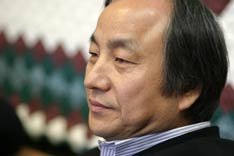
| ||||||||
| Bishops: Church Transcends National Borders | |||||||
|
LAKE JUNALUSKA, N.C. – Hospitality to the stranger is not an option for Christians, say two United Methodist bishops serving in areas with large populations of immigrants. Bishops Timothy W. Whitaker, Florida Area, and Hee-Soo Jung, Chicago Area, were part of a conference sponsored by The United Methodist Church on the biblical responses to the challenges of immigration in the United States. "In Florida, we have watched families torn apart and children left behind," said Whitaker. "Can you be silent about public policy that leaves children orphans?" In Chicago, a mother and her son have found sanctuary from deportation to Mexico in a United Methodist church. Elvira Arellano and her 7-year-old son have lived in Adalberto United Methodist Church since mid-August when she was threatened with deportation. "She is a member of the church; she is a lay leader," said Jung. "The law says she broke the law, but I am relating to her as her bishop, as a pastor. "Our immigration laws, the legal system is sometimes not embracing the whole diverse challenge and the changing of our society. I believe we need to practice Christian hospitality as a rule of life. When there is hurt, we need to go help the hurt." Whitaker and Jung were worship leaders at "Our Call to Hospitality: A Biblical Response to the Challenges of Immigration," held Feb. 1-3 at the United Methodist Lake Junaluska Conference and Retreat Center. The event was sponsored by the Southeastern Jurisdiction, which stretches from Kentucky to Florida, and the United Methodist Board of Church and Society, the social advocacy agency of the denomination. Participants were urged to work for comprehensive immigration reform. Personal involvement Whitaker said becoming personally involved with people is the key to understanding the immigration issue. "As we have gotten more involved with the new people in our community, we become more aware of some of the issues pertaining to immigration law in this country," Whitaker said. "I have thought for a long time we needed to have more of an intentional public conversation about immigration and try to educate ourselves and the people in our churches about the problems that exist." Jung said the way immigrants are treated is a faith issue. "We have deep trouble in our faith if we are not embracing the divinity and the kingdom which is really for all of us," he said. Keeping families together The issue of separating families is a big part of the debate and an important issue to both bishops. Whitaker told the story of a young mother with two children who were separated from their husband and father by a "knock on the door in the middle of the night" to be deported by U.S. immigration authorities. "That was two years ago," Whitaker said. "They are members of our church and they are struggling. When you experience these kinds of things, it really makes you want to be part of the public debate. I think if most Americans realized how some of our laws are being administered, they would say, ‘Wait a minute. Is this what we really want to do? Is this the kind of nation we really are?'" The Christian community is not encouraging people to break or sabotage the law, "but I think Christian witness sometimes means risk taking," Jung said. "When injustice happens, how are we going to be a neighbor? How are we going to be a witness of Jesus' love? That is beyond legal questions sometimes." "I think the church and the state have different roles," Whitaker adds. "If the church is an alternative, distinctive community in society, it is important for the church to be the church. That means the church has to live according to its own self-understanding which it gets from the Scripture and from Christian tradition." The immigration debate is based on "scarcity mentality," Jung said, citing a U.S. perception that the nation does not have enough jobs or property to share. "The church has to claim this is God's universe. We have got to proclaim this is a big place, a beautiful place for all people." Whitaker said that, while there must be order and a system for letting people come into the United States, "there is a lot of hostile attitudes toward people who are really proving to be very good neighbors in our society." Tension always will exist between church and the state, Whitaker said, "because the membership of the church transcends national borders." |
| ||||||
 |
Last
Updated February 10, 2007



